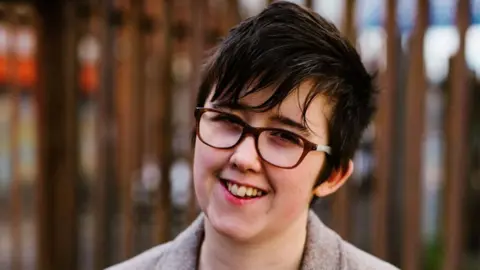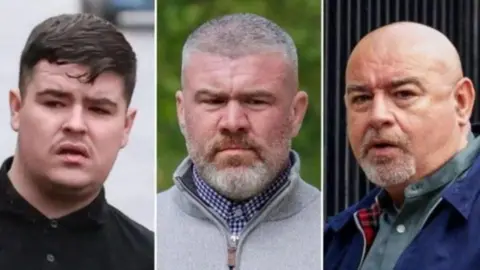Lyra trial hears policeman 'broke every rule in book'
 PA Media
PA MediaA police officer investigating the killing of Lyra McKee has been accused of "breaking every rule in the book" in relation to identifying suspects, the journalist’s murder trial has been told.
The 29-year-old was observing a riot in the Creggan estate in Londonderry in April 2019 when she was fatally shot.
The New IRA admitted responsibility for her murder.
Three men from Derry are on trial at Belfast Crown Court accused of her murder - Jordan Devine, 24, of Bishop Street; Paul McIntyre, 57, of Kells Walk; and Peter Cavanagh, 36, of Mary Street. They deny the charges against them.
On Monday the court heard evidence from one of the officers involved in the murder investigation.
The detective sergeant was questioned by a defence barrister about a "secret viewing" of images of masked men involved in the riot in Creggan on the night the journalist was shot.
This viewing took place before a formal “controlled viewing” which the non-jury trial has already heard was in breach of normal police procedure and protocol.
The police officer told the court at the time of the viewing, which he estimated took place sometime between 8 and 12 July 2019, he was part of the major investigations team based in the Maydown station in Derry.
As part of the investigation into Ms McKee's death, still images of masked men at the riot were uploaded on to an internal police system, the court was told.
This was a bid to establish whether any officers could identify the masked men in the images.
No identifications were made from the images.
The detective sergeant confirmed he decided to show a number of clips to members of the district support team (DST).
He did this without any direction from his superiors and failed to make relevant entries in his notebook about it, the court heard.
The court was told one of the four officers from the DST identified Peter Cavanagh as being one of the masked men rioting in Creggan.
 PA Media
PA MediaThe barrister for Mr Cavanagh described the viewing process as a "secret meeting".
He said it had taken place prior to a formal controlled viewing.
This formal process, the barrister told the court, was always conducted in the Police Service of Northern Ireland's cyber support unit and on a “one-on-one” basis involving the identification officer and the officer viewing stills or CCTV footage.
The barrister asked the detective sergeant: "You would have known it was highly inappropriate before you purport to recognise anyone to have a chat with colleagues. Is that right?"
The detective sergeant replied: "That's correct, yes."
'I don't recall doing that'
The police witness was asked if he was aware that it was "highly inappropriate" to have a group identification before a controlled viewing.
The detective sergeant replied: "Yes, that's correct."
By bringing footage to the four officers in a "secret showing", the defence barrister accused the detective sergeant of "breaking every rule in the book".
"I wouldn't say that,” the police officer said.
He said that at the time he was showing "better quality footage" to the DST officers for potential identification purposes.
He did, however, accept that he did not record the viewing in his notebook and that he did not take any statements.
The police officer also asked about a claim made during evidence earlier in the trial from one of the DST officers that he nodded during the "secret meeting" when Mr Cavanagh was identified.
The detective sergeant said "that's his account but I don't recall doing that".
Seven other men, all from Derry, are on trial on charges which include rioting and throwing petrol bombs.
They are: Joseph Barr, 36, of Sandringham Drive; Jude McCrory, 27, of Gartan Square; William Elliott, 58, of Ballymagowan Gardens; Joseph Campbell, 24, of Gosheden Cottages; Patrick Gallagher, 32, of John Field Place; Christopher Gillen, 44, of Balbane Pass, and Kieran McCool, 56, of Ballymagowan Gardens.
All have denied the charges against them. The trial continues.
